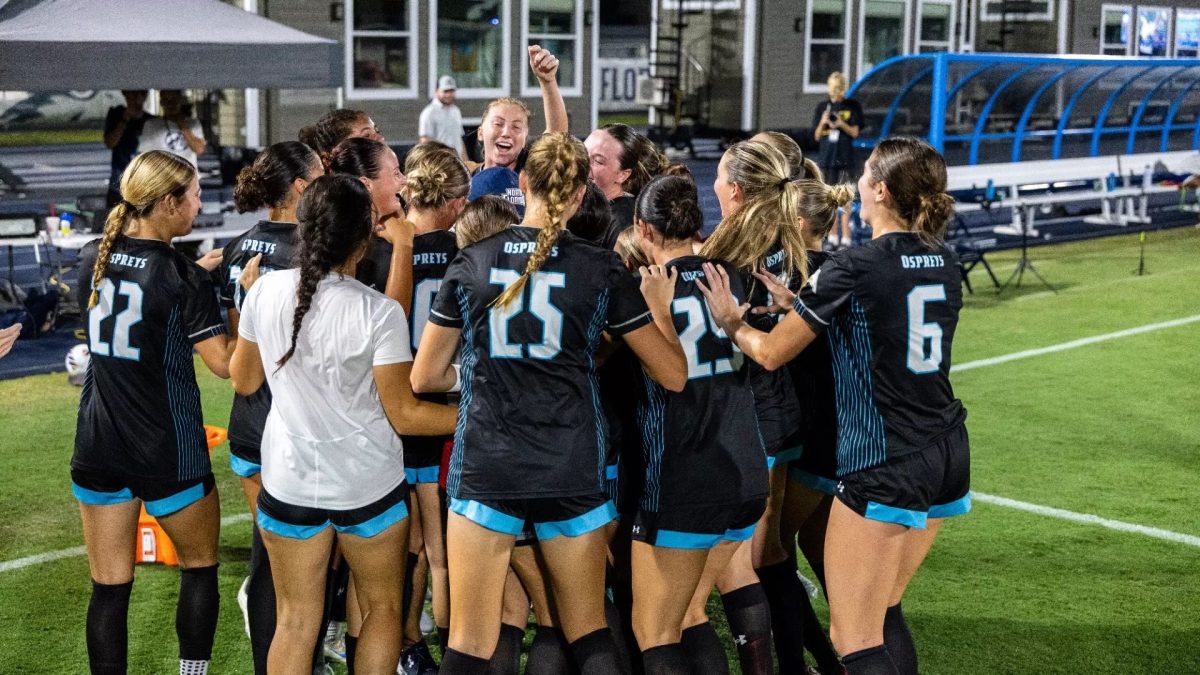By Katie Gile, Staff Reporter

Among the numerous racks of Nike hoodies, T-shirts and sweatpants emblazoned with UNF’s Osprey within the Bookstore are two racks filled with the wares created by the only company to pay its factory workers a “living wage.”
Alta Gracia Apparel, named for the town in the Dominican Republic where its factory is located, pays a living wage of $2.83 per hour, which is more than triple the $0.84 minimum wage for apparel workers.
This wage helps the workers to better provide for themselves and their families, including food, clean water, housing and education, Taber said.

In the UNF Bookstore, Alta Gracia sells basic print T-shirts for $20, textured print T-shirts for $25 and long-sleeved shirts for $26. Competitor brands like Nike, Champion and Jansport are priced similarly, with T-shirts for $20, $20 and $18, respectively.
Taber said offering the living wage only adds to their competitiveness as a brand.
“It’s still profitable and in fact has increased our productivity,” Taber said. “It has increased our business because students and retailers believe in what we’re doing.”
The Alta Gracia products currently occupying a handful of racks in the first floor of the Bookstore are a student activism project waiting to happen, said David Jaffee, a sociology professor at UNF.
“Students on other campuses have organized themselves and said ‘This is on our campus, selling to our students. We have certain values,’” Jaffee said. “And it’s up to the students to determine what those values are.”
Though Alta Gracia is the only brand to offer a living wage, Follett, the company owning and operating UNF’s Bookstore, requires every brand to follow its own code of conduct for working conditions and is overseen by the Fair Labor Association.
The FLA, founded in 1999, is a watchdog for working conditions within brands. As a retailer and member of the FLA, Follett must abide by its regulations as well as those the FLA requires.

A similar organization, United Students Against Sweatshops, and its affiliate, the Worker’s Rights Consortium work toward the same cause and have championed Alta Gracia.
The WRC is an independent and free monitor that performs long-term investigations of working conditions across the world, said Teresa Cheng, a national organizer for USAS.
There is a thread of discord between the WRC and FLA, Cheng said, because where the WRC is free from corporate ownership, the FLA’s corporate stakeholders are in a position to oversee their own factories.
“It’s a ‘fox-in-the-henhouse’ model, in which corporations monitor their own sweatshops,” Cheng said. “In an organization composed of the corporations themselves, it would be difficult to accurately and independently monitor those same sweatshops that they profit from.”
However, Cheng said, the WRC regularly monitors Alta Gracia and as such, USAS champions the brand to its many chapters across the country.
Though UNF does not have a chapter of the WRC on its campus like the neighboring University of Florida, Cheng said students still have the power to affect what happens on campus. All they need do is “flex their muscles.”
“Students have very unique leverage on their university campuses that makes them a more powerful group than any other consumer group in the world,” Cheng said. “They just have to say, ‘If you want to make our apparel and use our logo, then you have to follow our standards.’”
Haleigh Morgan, public and campus relations specialist for Follett, said the retailer has expanded the number of its stores carrying the line from 80 to 120 and doubled its product commitment for the fall semester.
Though the UNF Bookstore could not supply the sales numbers among brands, Trade Manager Amy Dielo said the products currently on the sale floor reflect which products students have purchased.
“What you see on the floor is where we have success,” Dielo said.
If students wish to see more change on campus, Morgan said they should illustrate their desire for Alta Gracia through its purchase from the Bookstore.
“A conversation would need to happen between the planners of the bookstore and the people at Alta Gracia to verify that this would cover all the needs of all the students on campus,” Morgan said.
John Silang, UNF Club Alliance Chair, said publicizing its altruistic components would greatly improve the sale of Alta Gracia on campus.
“When someone tells me that the UNF Bookstore offers fair labor clothing, it makes me more inclined to buy it,” Silang said. “If there was a big product description next to it and around the store, I think students would definitely go for it.”
To quickly affect its availability and the availability of more Fair Labor products on campus, Jaffee suggests that students study what worked at other universities that sell primarily or entirely Alta Gracia apparel.
“If the students communicate they care about this and it’s an issue, people will take notice,” he said.
Jaffee said the effect of student awareness and involvement in issues like fair labor stretches far beyond the walls of a campus bookstore.
“You act locally, but you think globally,” Jaffee said. “Most of what we consume is produced elsewhere. So, as students become more aware of that, they shape their political conceptions and their buying habits. Then we’ll have a real difference.”
Email Katie Gile at staff1@unfspinnaker.com.















